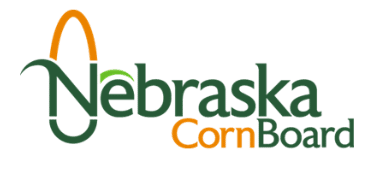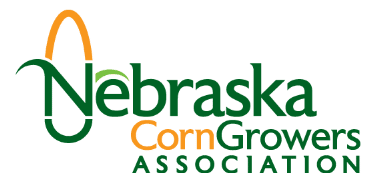What Is a Checkoff?
The Nebraska corn checkoff, administered by the nine farmer directors of the Nebraska Corn Board, is a self-help investment program designed to help develop, carry out and participate in programs of corn education, research, market development and promotion to enhance profitability (viability) and expand the demand and value of Nebraska corn and value-added corn products.
The corn checkoff was established in 1978 via the Corn Resources Act, which was passed by the Nebraska Legislature. The effort was led by Nebraska corn producers themselves — most notably members of the Nebraska Corn Growers Association.
The corn checkoff is collected at the time corn is first sold to a buyer. These buyers-or “first purchasers”- include grain elevators, cooperatives, ethanol plants and livestock producers. The first purchaser is responsible for remitting the checkoff. The Nebraska Department of Agriculture provides information on paying the checkoff.
Corn checkoff funds are administered and invested by the Nebraska Corn Board, which is made up of nine farmer directors who serve three-year terms. Eight members represent specific Nebraska districts and are appointed by the Governor. The Board elects the ninth “at large” member. An executive director and staff serve at the pleasure of the board.
The Nebraska corn checkoff rate is 1 cent per bushel ($0.01/bu.) From 2012 to 2024, the checkoff rate was 1/2 of a cent per bushel ($0.005/bu.) The rate was originally set at 1/10 of a cent per bushel ($0.001/bu.) when the checkoff was established in 1978, and was increased to 1/4 of a cent per bushel ($0.0025) in 1988.
Both the Nebraska Corn Board and Nebraska Corn Growers Association work together on various efforts and are dedicated to advancing Nebraska’s corn industry. Together, they are often branded or identified as “Nebraska Corn.” While they often partner together to support the state’s corn industry, they each have distinct organizational structures, missions and scopes of work.
By law, every Nebraska corn farmer invests in the corn checkoff administered by the Nebraska Corn Board by paying the checkoff on each bushel of corn they sell. On the other hand, membership in the Nebraska Corn Growers Association is a choice.

- A state agency created by statute in 1978
- Funded through a 1/2-cent-per-bushel checkoff assessed on all corn marketed in the state
- All corn producers are required by law to invest in the checkoff
- Prohibited by law from lobbying at the state level-and restricted in its ability to influence federal policy
- Focused on market development, research, promotion, education and building domestic and international demand for corn, red meat, biofuels and corn co-products
- Invests in programs, research and initiatives that capitalize on opportunities for Nebraska corn producers

- An independent member-supported association begun in 1972
- Supported through dues paid by its membership
- Growers make a personal choice to join an support their industry
- Can lobby on policy and regulatory issues at the state and national levels
- Focused on farm policy, regulatory issues, leadership development and grower education
- Helps create a policy and regulatory environment that enhances the future of Nebraska corn producers
In general, there is no refund provision for the corn checkoff.
If corn is pledged as collateral for a CCC loan through the FSA, producers are eligible for a refund if the corn is redeemed and then fed by the producer to his or her livestock.
To receive a checkoff refund for loan grain that is redeemed to be fed to that producer’s livestock, the producer must send a copy of his/her farm storage note and security agreement (Form CCC 677) and all loan repayment receipts (Form CCC 500) to the Fee Collection Program in care of the Nebraska Department of Agriculture, PO Box 94947 Lincoln, NE 68509-4947. A refund request can be made at any time after repayment or up to 30 days after the life of the loan.
Corn grown by a producer and then fed to the producer’s livestock is not subject to the checkoff.
Generally, the only time this type of situation could happen would be if the producer had the grain under a CCC loan and the loan was redeemed and the grain then marketed into commercial channels. It is important that, if the producer redeems the corn and then sells it, the CCC repayment sheets (showing the payment of the checkoff) be used as proof to prevent the checkoff from being assessed a second time. In situations when an assessment is taken a second time, it is the producer’s responsibility to contact the purchaser of the redeemed loan corn and ask for a refund after providing the necessary proof of assessment. Refunds can only be requested from the entity that purchased the grain. FSA offices are not responsible to make any refunds. If the grain was checked off twice, an individual has one year from the point in time a double assessment occurred to request a refund. Any questions relative to this can be made to the Fee Collection Program.
The Fee Collection Program, administered by the Nebraska Department of Agriculture, in cooperation through contractual arrangements with the various commodity groups, administers a joint fee collection program for all of the agriculture checkoff programs authorized by statute. Please write or call the Fee Collection Program, P.O. Box 94947, Lincoln, Nebraska 68509-4947, phone 402-471-6819 or email agr.commodityfees@nebraska.gov.

